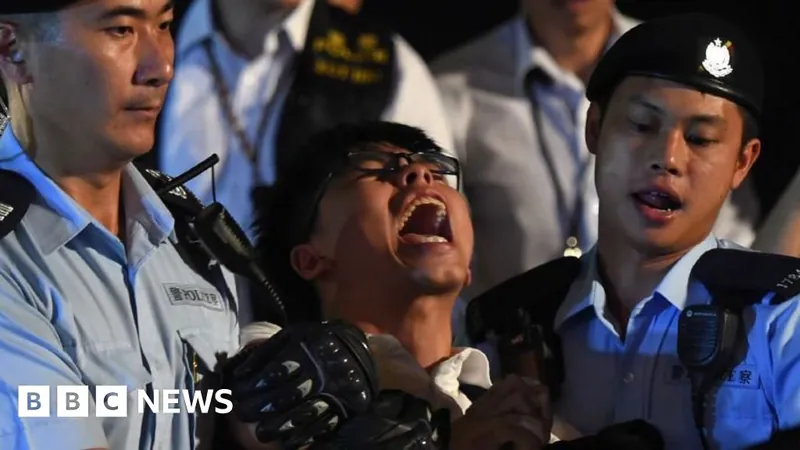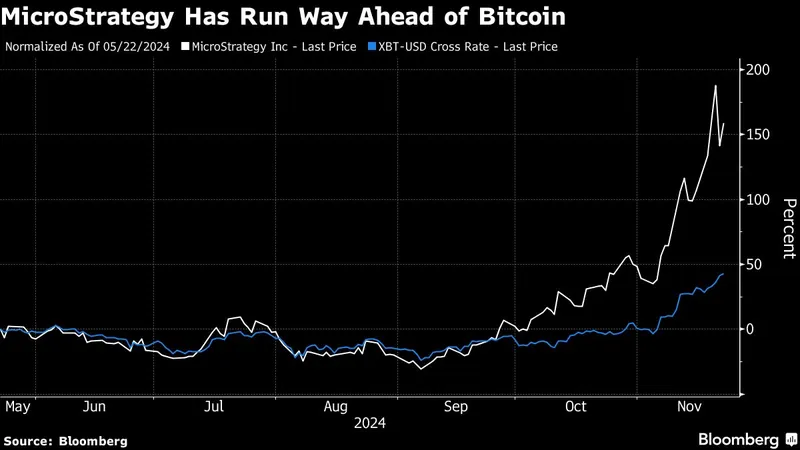
Hong Kong’s Pro-Democracy Leaders Face Heavy Sentences in Landmark National Security Case
2024-11-19
Author: Jia
In a highly controversial ruling, a Hong Kong court has sentenced 45 pro-democracy activists to prison terms ranging from four to ten years under the national security law (NSL), marking a significant blow to the city's beleaguered pro-democracy movement. This mass sentencing follows a national security trial that has drawn condemnation from international observers who describe the proceedings as politically driven.
Among those sentenced are well-known figures such as Benny Tai, who received a 10-year sentence, and Joshua Wong, sentenced to over four years. Both were part of the “Hong Kong 47,” a group of activists and lawmakers charged with conspiracy to commit subversion. Their actions stemmed from an attempt to organize opposition candidates for upcoming local elections, an initiative that ultimately alarmed the Chinese authorities.
The national security law, imposed by Beijing in mid-2020 following widespread protests against a proposed extradition bill, has been criticized for stifling free speech and political expression in Hong Kong. The mass arrests that occurred in early 2021 were seen as a concerted effort to dismantle the pro-democracy movement that had gained momentum during the 2019 protests, which saw hundreds of thousands of people rallying for greater political freedoms and democratic reforms.
Emily Lau, a former chair of the Democratic Party in Hong Kong, expressed the chilling environment activists now face: "The fear of being arrested under the NSL is so overwhelming that we can barely organize even informal gatherings among friends."
International reactions have been fierce. The United States labeled the trial “politically motivated,” while Australian officials voiced grave concern over the sentencing of one of its citizens, Gordon Ng. The UK Prime Minister, Sir Keir Starmer, even brought the plight of imprisoned billionaire activist Jimmy Lai to the attention of Chinese President Xi Jinping during a recent G20 summit, emphasizing the growing international scrutiny of Beijing's crackdown.
The Chinese government, however, maintains that the NSL is critical for the stability and security of Hong Kong. They have vehemently rejected claims that it undermines the region's autonomy, stating, “No one can engage in illegal activities in the name of democracy.”
The highly publicized trial has sparked significant interest among Hong Kong residents, many of whom queued outside the courtroom in anticipation of the verdict. Public sentiment during the sentencing was palpable, with family members of the convicted activists visibly emotional. Wong, despite his challenges, expressed his love for Hong Kong just before his departure from the dock, a poignant reminder of the enduring spirit among supporters of democracy.
The convictions not only highlight the severe penalties now associated with political dissent but also underline a broader trend of increasing repression in Hong Kong. As the pro-democracy landscape continues to dwindle, many activists have fled overseas, fearing for their safety and that of their families back home.
Analysts believe this ruling could have long-standing implications. Dr. John P. Burns, an esteemed professor at the University of Hong Kong, posited that the trial was part of a wider strategy by Beijing to re-educate the population, signaling that national security remains the top priority, thus discouraging any form of resistance.
Furthermore, the chilling effect of the NSL is palpable; self-censorship is reportedly on the rise within civil society, as activists assess the increasingly hostile environment. Sunny Cheung, a participant in the primary elections, noted, "The Beijing government may remove visible opposition, but they are simultaneously alienating an entire generation—trust in the authorities is eroding.”
This moment in Hong Kong's legal history serves as a stark reminder of the long-standing struggle for democracy and the heavy costs associated with it in the wake of increasingly authoritarian rule. The outcome of this trial may ripple through the fabric of Hong Kong society for years to come, challenging the very essence of the freedoms once taken for granted.




 Brasil (PT)
Brasil (PT)
 Canada (EN)
Canada (EN)
 Chile (ES)
Chile (ES)
 España (ES)
España (ES)
 France (FR)
France (FR)
 Hong Kong (EN)
Hong Kong (EN)
 Italia (IT)
Italia (IT)
 日本 (JA)
日本 (JA)
 Magyarország (HU)
Magyarország (HU)
 Norge (NO)
Norge (NO)
 Polska (PL)
Polska (PL)
 Schweiz (DE)
Schweiz (DE)
 Singapore (EN)
Singapore (EN)
 Sverige (SV)
Sverige (SV)
 Suomi (FI)
Suomi (FI)
 Türkiye (TR)
Türkiye (TR)